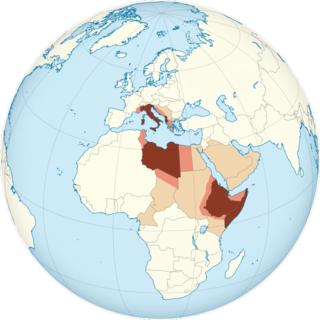Related Research Articles

Filippo Tommaso Emilio Marinetti was an Italian poet, editor, art theorist, and founder of the Futurist movement. He was associated with the utopian and Symbolist artistic and literary community Abbaye de Créteil between 1907 and 1908. Marinetti is best known as the author of the first Futurist Manifesto, which was written and published in 1909, and also of the Fascist Manifesto.

Italian East Africa was an Italian colony in the Horn of Africa. It was formed in 1936 through the merger of Italian Somalia, Italian Eritrea, and the newly occupied Ethiopian Empire, conquered in the Second Italo-Ethiopian War.

Giovanni Papini was an Italian journalist, essayist, novelist, short story writer, poet, literary critic, and philosopher. Among the founders of the journals Leonardo (1903) and Lacerba (1913), he conceived literature as an "action" and gave his writings an oratory and irreverent tone. Though self-educated, he was considered influential iconoclastic editor and writer, leading in Italian futurism, he participated in the early literary movements of youth. A living part of the literary, foreign philosophical and political movements, such as the French intuitionism of Bergson and the Anglo-American pragmatism of Peirce and James, which at the beginning of the twentieth century promoted the aging of Italian culture and life from Florence, in the name of an individualistic and dreamy conception of life and art, and a spokesman in Roman Catholic religious belief. Papini's literary success began with his known works include Il Crepuscolo dei Filosofi, published in 1906, and his 1913 publication of his auto-biographical novel Un Uomo Finito.
Acri may refer to:

Alfredo Rocco was an Italian politician and jurist. He was Professor of Commercial Law at the University of Urbino (1899–1902) and in Macerata (1902–1905), then Professor of Civil Procedure in Parma, of Business Law in Padua, and later of Economic Legislation at "La Sapienza" University of Rome, of which he was rector from 1932 to 1935.
Italian anarchism as a movement began primarily from the influence of Mikhail Bakunin, Giuseppe Fanelli, and Errico Malatesta. Rooted in collectivist anarchism, it expanded to include illegalist individualist anarchism, anarcho-syndicalism, and especially anarcho-communism. It participated in the biennio rosso and survived Italian fascism. Platformism and insurrectionary anarchism were particularly common in Italian anarchism and continue to influence the movement today. The synthesist Italian Anarchist Federation appeared after the war, and autonomismo and operaismo especially influenced Italian anarchism in the second half of the 20th century.

The Years of Lead is a term used for a period of social and political turmoil in Italy that lasted from the late 1960s until the late 1980s, marked by a wave of both far-right and far-left incidents of political terrorism.

Carmelo Borg Pisani was a Maltese artist and Italian Fascist spy, condemned to death for treason in 1942.

Italian Tunisians are Tunisians of Italian descent. Migration and colonization, particularly during the 19th century, led to significant numbers of Italians settling in Tunisia.

Imperialism, colonialism and irredentism played an important role in the foreign policy of Fascist Italy. Among the regime's goals were the acquisition of territory considered historically Italian in France and Yugoslavia, the expansion of Italy's sphere of influence into the Balkans and the acquisition of more colonies in Africa. The pacification of Libya (1923–32), the invasion of Ethiopia (1935–36), the invasion of Albania (1939), the invasion of France (1940), the invasion of Greece (1940–41) and the invasion of Yugoslavia (1941) were all undertaken in part to add to Italy's national space.

The Italian colonial empire, known as the Italian Empire between 1936 and 1943, comprised the colonies, protectorates, concessions, dependencies and trust territories of the Kingdom of Italy. The genesis of the Italian colonial empire was the purchase in 1869 of Assab Bay on the Red Sea by an Italian navigation company which intended to establish a coaling station at the time the Suez Canal was being opened to navigation. This was taken over by the Italian government in 1882, becoming modern Italy's first overseas territory.
The media of Tunisia is an economic sector. Under the authoritarian regimes of Habib Bourguiba, and then Zine el-Abidine Ben Ali, it saw periods of liberalization and then challenges, notably due to Tunisian censorship. The 2010-2011 Tunisian protests and the subsequent change in government may bring significant change in this domain.
This is a list of words, terms, concepts, and slogans in the Italian language and Latin language which were specifically used in Fascist Italian monarchy and Italian Social Republic.

Italian irredentism in Switzerland was a political movement that promoted the unification to Italy of the Italian-speaking areas of Switzerland during the Risorgimento.
Il Liberatore was an Italian language underground publication issued by the Italian section of the Tunisian Communist Party. Il Liberatore appeared in 1935, after the antifascist weekly Domani had been banned.
MPS Capital Services Banca per le Imprese S.p.A. known as MPSCS in short, is an Italian corporate and investment bank based in Florence, Tuscany. The bank is a subsidiary of Banca Monte dei Paschi di Siena. The subsidiary was known as MPS Banca per l'Impresa until 2007.
The World Committee Against War and Fascism was an international organization sponsorized by the Communist International, that was active in the struggle against Fascism in the 1930s. During this period Adolf Hitler came to power in Germany, Italy invaded Ethiopia and the Spanish Civil War broke out. Although some of the women involved were Communists whose priority was preventing attacks on the Soviet Union, many prominent pacifists with different ideologies were members or supporters of the committee. The World Committee sponsored subcommittees for Women and Students, and national committees in countries that included Spain, Britain, Mexico and Argentina. The Women's branches were particularly active and included feminist leaders such as Gabrielle Duchêne of France, Sylvia Pankhurst of Britain and Dolores Ibárruri of Spain.
Scuola "Enrico Mattei" is a private Italian international school in Morocco which is headquartered in Casablanca. The main campus in Casablanca includes preschool, primary school, lower secondary school, and upper secondary school. There is also a branch school in Tangier.
Nexi S.p.A. formerly known as Istituto Centrale delle Banche Popolari Italiane S.p.A. (ICBPI) is an Italian bank that specialise in payment systems such as Nexi Payments. The bank was specialised as a central institution of Italian Popular Bank..

Open access to scholarly communication in Italy has grown since the early 2000s. During an academic conference in Messina in November 2004, Italian universities joined the Berlin Declaration on Open Access to Knowledge in the Sciences and Humanities, in Italy thereafter known as the "Declaration of Messina".
References
- 1 2 Nomenclature des journaux & revues en langue française du monde entier . Paris, Les bureaux de l'Argus, 1937. p. 467
- 1 2 Brondino, Michele. La stampa italiana in Tunisia: storia e società, 1838-1956 . Milano: Jaca Book, 1998. p. 199
- ↑ Africa: notiziario dell'Associazione fra le imprese italiane in Africa , Vol. 62. Associazione fra le imprese italiane in Africa, 2007. p. 452
- 1 2 Bessis, Juliette. La Méditerranée fasciste . 1981. p. 173